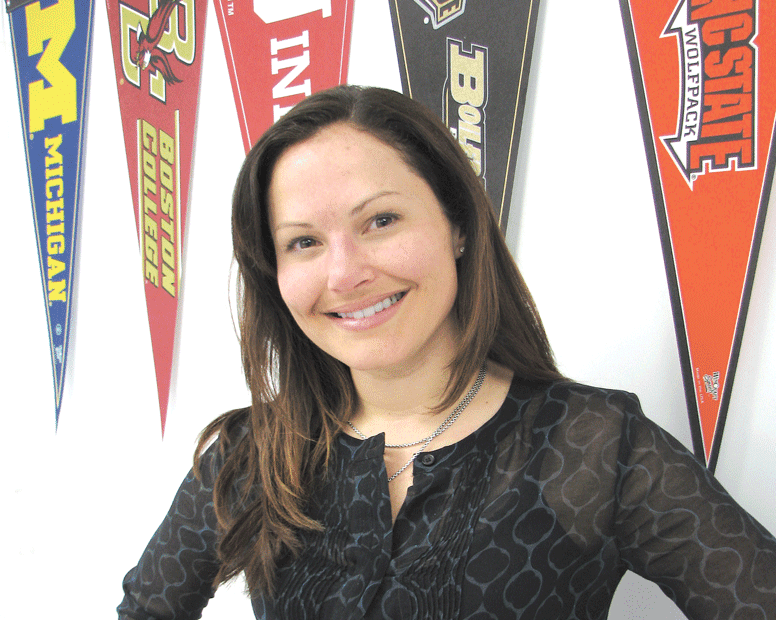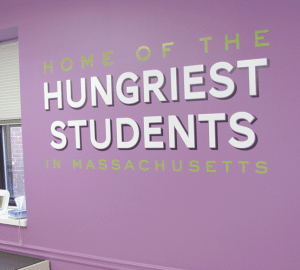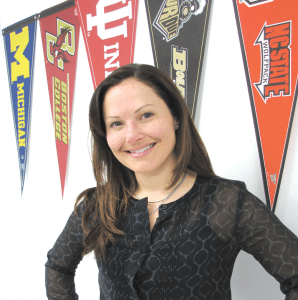
Pennant Fever
At Veritas Prep, College Isn’t a Goal — It’s an Expectation
Everywhere one looks at the Veritas Preparatory Charter School in Springfield are not-so-subtle reminders concerning what this place is all about — preparation for college.For starters, there are old-fashioned pennants, representing dozens of schools from across the country, adorning several walls in the cafeteria and the hallways by the front office. “We got started by ordering a bunch of them,” said Rachel Romano, the school’s founder and executive director. “People will come in and say, ‘where’s my college?’ and we’ll tell them they have to get us a flag.”
Meanwhile, the three classrooms are named for schools attended by some of the faculty members — Bryant, Depaul, and Chicago (short for the University of Chicago) are currently in use. And there are large banners for UMass Amherst — the alma mater of many staff members — and Syracuse, where Romano majored in broadcast journalism, but ultimately, and obviously, took another career path.
These visual displays are designed to keep both students and staff focused on what could be considered a goal, but what Romano would prefer to consider something more — an expectation.
And that distinction is one of a host of things that separates Veritas Prep, which currently has a fifth-grade class but will eventually serve grades 5-8, from other middle schools in Springfield, where close to half the individuals who start high school don’t finish it.
Many of the others can be learned through a discussion of one of Romano’s more imaginative programs, called ‘scholar dollar paychecks.’ It’s an initiative designed to introduce students to the world they’ll eventually be joining, a professional world in which they’ll take home a paycheck.
The checks they’ve been issued since last September, when the school opened, are based on an initial ‘salary’ of $100 in phony currency. The amount on the actual weekly check is determined by how well a student lives up to the many Veritas Prep expectations (there’s that word again) for conducting oneself.
There are ways to earn bonuses, through work that exemplifies the school’s unofficial slogan: DRIVE (determination, responsibility, integrity, vision, and enthusiasm). But there are also deductions that come in many flavors and denominations.
There are $3 assessments, for example, for things like not sitting up straight after a reminder to do so, talking out of turn, and having a ‘fixable uniform violation,’ such as having one’s shirt untucked. And then, there are $10 hits for things like disrespect toward staff or a student, swearing or inappropriate language, or even “consuming candy, gum, soda, energy drinks, sports drinks, or juices of minimal nutritional value” during school hours.
At Veritas, the school day is roughly two hours longer than at most public schools (7:20 a.m. to 4 p.m., with after-school activities that keep many in this former nursing home until 6), the school year is 10 days longer, and students leave each afternoon with at least an hour of homework to do. There are many reasons for this, said Romano, but the most obvious is that these students need the extra time in the classroom and the extra work.
Indeed, most all of them came in last August behind grade level for all subjects — in some cases, well behind, she said, citing one student who didn’t even know the alphabet, but was nonetheless in the fifth grade.
He’s getting caught up, slowly but surely, she told BusinessWest, adding that the first assignment for the staff is to get all students back up to grade level. And from there, the goal is get them ready — and motivated — to do all the work needed to attend one of those places represented by all those pennants and banners.
For this issue and its focus on education, BusinessWest takes an in-depth look at this unique charter school, where a different banner in the cafeteria tells the story. “Home to the hungriest students in Massachuetts,” it reads, with Romano adding, “they’re hungry for the knowledge to send them to college.”
Grade Expectations
When asked how she wound up essentially handling payroll for 81 fifth graders, among myriad other duties as executive director, Romano eased back in her chair and offered a look that would suggest that this was to be a long story.
And it was, but one worth telling.
It starts, in most respects, on 9/11 and the days that followed, but to relate the saga properly, she went back further, to some career decisions upon graduating from Syracuse with that broadcasting degree.

This banner in the cafeteria at Veritas Prep tells the story about what this unique school is all about.
So well, in fact, that, by the summer of 2001, she was able to move up from an apartment at 53rd and 9th streets that she shared with two others to a place of her own downtown, just a block from the World Trade Center.
Sept. 11 was the Tuesday after a Monday night football game featuring the New York Giants. Romano, who watched with some co-workers until the end, was running just a little late that morning, but enough to become trapped in her apartment building while the Twin Towers were attacked, eventually to collapse, just a few hundred yards away. It was a sequence of events she could generally hear — “when the towers fell, that was the loudest noise I ever heard” — but couldn’t see (there was no television because power was out), which was a real problem.
“I didn’t know what was going on; I thought my building was on fire,” she recalled. “I heard the towers had collapsed, but you can’t process that information unless you actually see it. I definitely thought I was going to die that day; I actually called my mother to say goodbye — I thought it was over.”
She was eventually hustled into the building’s basement, where she and others stayed for hours, but later that afternoon was bused uptown. She eventually found her way to Grand Central Station, and, with nothing but the clothes on her back, got on a train to New Haven, where her very relieved mother picked her up and took her home to South Hadley.
Unable to return to her New York apartment for three months, she stayed in Western Mass. for a while and soon grew tired of people asking her to relive the events of that infamous day — so tired that she took a job substitute teaching in her hometown.
And that’s where the story really starts to turn.
Romano found the work tedious — she was subbing at South Hadley High School, after all — but in many ways rewarding. But she quickly came to the conclusion that, if she was going to make a seismic career shift into education, it should be in a place “where it mattered.”
And by that, she meant the ability to change the course of a student’s life, something she was quite sure she wasn’t going to do in South Hadley, but thought she could do in Springfield.
“Kids in South Hadley or Longmeadow … they’re going to be fine, in spite of school; they’re probably going to go to college, and if they don’t, they’ll make another choice, but they’ll be fine,” she told BusinessWest. “Kids in Springfield need school to be successful in this world, and, unfortunately for kids in Springfield, the schools they’re getting aren’t preparing them to be successful in this world.
“If I was going to teach,” she continued, “it was going to be in a place where I could make a difference in someone’s life.”
Fast-forwarding a little, she got a job teaching sixth grade at Duggan Middle School. And while she enjoyed the work, she didn’t feel it offered her enough opportunity to make an impact, so she segued into leadership and became an assistant principal.
“I embraced the challenge and eventually became obsessed with it,” she said. “First it was my classroom for three years, and then it was like, ‘I have to help fix this broken school.’ I eventually came to think that it didn’t really matter what I did as a sixth-grade teacher — I can give kids one great year, but that doesn’t change the trajectory of their lives.”
Spelling It Out
Still desiring a way to broaden her impact in the community through work in education, Romano started conceptualizing a new charter school for Springfield, one she envisioned to be much more of an equalizer than other facilities in the city.
But the timing wasn’t right, and for many reasons. For starters, she thought she wasn’t quite ready professionally for such a venture. And, more to the point, charter schools were capped at that time, and they were starting to lose favor in many communities due to poor results. “Charter schools haven’t been very big in this region, and, quite frankly, they haven’t been very successful; we’ve seen some of these schools close.”
So Romano took a job as principal with a charter school in Framingham, where she grew professionally and found a number of best practices to borrow, but still felt the environment wasn’t what she was looking for. “I went home every night thinking, ‘these kids are going to go to college no matter what I do.’”
Eventually, the cap on charter schools was lifted in communities with the 10 lowest-performing school districts (and Springfield certainly fit in that category), and Romano went about making her dream a reality.
She recruited a board of directors, which included many area business leaders, and, after considerable editing, whittled her plan for what would become Veritas down to the maximum 155 pages, as directed by the state Board of Education.
Beyond the plan was an attitude. “I wanted to bring to Springfield a school that would get results, a school that would be a game changer for the city,” she noted. “The last thing Springfield needed was another underperforming school.”
The school’s reason for being is effectively conveyed in this paragraph from its executive summary:
“Veritas Prep’s mission and educational program are created in response to the compelling need in Springfield for a public middle school that prepares students to achieve in high school and college,” Romano writes. “With a high-school graduation rate of 54%, Springfield students are not prepared with the skills and competencies they need to move forward. Long before high school, Springfield students begin the process of dropping out of their education — and the promise of their and our future — prior to the successful conclusion of 12th grade. The source of this process for many of our most underachieving students has its roots in the middle school years.”
Summarizing the school’s approach to changing the equation for its students, Romano said it “sweats the little things” as it teaches students how to be Veritas Prep scholars, and that phrase applies to both education and behavior.
“At Veritas, we have incredibly high expectations for both academics and behavior,” she explained, “and a lot of support so they can meet those expectations.”
The first week of school amounts to orientation, she went on. “And we start from scratch, almost as if they’ve never attended school before. We teach them how to sit up at their desks, which we call being ‘in slant.’ They have to listen, and they show they’re listening by asking and answering questions, nodding their head, and tracking the speaker.
“That sounds like a very basic expectation,” she went on, “but if you, as a fifth-grader, have always sat at your desk with your head on your hand looking out the window, that’s hard to do.”
The same approach is taken with everything from morning greetings — Romano gives each student a professional handshake — to the dress code. “When they come here, they’re here to be a student, and there are expectations to be met.”
A Stern Test
As for learning in the classroom, the basics apply there as well, said Romano, adding that the initial goal is to have students learning at grade level, which is challenging, because most of these fifth-graders entered the school year last fall at what was basically the third-grade level.
In a nutshell, the approach is not to dwell on what’s happened — or not happened, as the case may be — in the past, but to focus on steady improvement that will get the student back up to where he or she needs to be. And in a charter-school environment, faculty members can focus on individual students’ needs.
“The teachers here have the flexibility and nimbleness to adapt their program to the needs of their students,” she explained. “So if Ray needs more math tutoring this week than he does reading, that’s what he can get. Being able to really differentiate our students based on their needs is so important, as is the ability to respond to the data we get from assessments.
“They’re learning to think, which is not something many of them are used to doing,” said Romano in summing things up. “It’s been hard, but we have seen considerable progress with getting them to talk, to discuss, and write thoughtfully.”
Praise and recognition are big parts of the equation at Veritas, said Romano, adding that students are singled out for earning large paychecks, making considerable improvement over the last paycheck, attendance, homework completion, and a host of other things.
Such praise is often directed at a student’s resilience, she went on, adding that this is another trait the school works to emphasize.
“One of the things we also teach kids is how to bounce back from a deduction,” she said. “We tell them that they make choices, and every choice earns them a reward or a consequence. They either choose to do the right thing, follow the rules, and keep their scholar dollars, or they choose to do the wrong things and lose them. But it’s important to bounce back and learn from those mistakes.”
Those scholar dollars can be used to ‘buy’ trips (college campus visits on Saturdays) and extra curricular activities (such as movie night at school), and supplies at the school store. Students can also use their earnings to bid on items at the ‘scholar dollar auction.’ which happens at the end of each trimester. Coveted auction items include things like being the school leader for a day, teaching one’s favorite subject for a day, hiking with a teacher, playing chess with a teacher, getting a violin or ukulele lesson, movie night with 10 friends, and a day for your entire class to be out of uniform (that one usually gets the highest bids). These exercises enable students to learn about financial literacy, said Romano, or, more specifically, about not spending more than they earn.
Summing up the basic philosophical difference between Veritas and most Springfield public schools, she once again went back to that word expectations.
“There are so many excuses that people make about why kids in Springfield, or any urban area for that matter, don’t achieve as well as others,” she said. “We know what the challenges are. We know that these families are struggling and the parents may not have educations themselves. But I really think it comes down to expectations.
“The first question I’ll ask teaching candidates, after we’ve screened them and asked them to answer a set of essay questions, is, ‘do you believe our students can achieve at high levels?’” she continued. “After explaining that most of our students come to us several grade levels behind, I ask candidates, ‘do you think we should hold these students to the same expectations at the end of the year as the fifth graders in Longmeadow, for example?’
“It’s usually a very gut reaction — people say ‘absolutely’ or ‘absolutely not,’” she went on. “And I know, if you say ‘absolutely not,’ what you’re telling me is that it doesn’t matter if you show up to work every day — these kids will never be where those children are, and we can’t have that attitude here.”
Romano noted Veritas is still only nine or so months old, and there are myriad challenges ahead — from finding talented faculty members as the school adds grades in each of the next three years, to finding or building a gym (physical education is currently limited to what students can do outdoors or in the hallways), to getting students’ parents more engaged in their education.
But she can already feel a strong sense of accomplishment.
“It’s been a lot of work, a real grind,” she said of the process of conceptualizing the school, making it a reality, and then carrying out its mission every day. “But it’s been the most remarkable thing I’ve ever done.”
Degree of Difficulty
While payroll bonuses are highly prized, the most coveted honor at Veritas at present is the so-called Golden Toilet Seat.
It goes to the team — boys or girls — that has the cleanest restroom, as determined by rigorous weekly inspections.
“It’s a big deal. We do a drum roll and everything: ‘and the winner of the Golden Toilet Seat is …,’” said Romano. “I think some of them of them still believe it’s real gold, although a few might be catching on.”
By the time they move on from Veritas, the students will be firmly focused on a much bigger prize — a college education. Time will tell how many of them will get there, but all indications are that their odds will be greatly improved by attending this unique facility.
That’s because, here, college isn’t a goal. It’s an expectation.
George O’Brien can be reached at [email protected]







